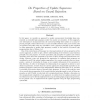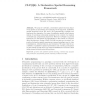276 search results - page 25 / 56 » Representing Transition Systems by Logic Programs |
TPLP
2002
13 years 7 months ago
2002
In this paper, we consider an approach to update nonmonotonic knowledge bases represented as extended logic programs under the answer set semantics. In this approach, new informat...
ICLP
2005
Springer
14 years 1 months ago
2005
Springer
We present a methodology for the modeling of complex program behavior in CLP. In the first part we present an informal description about how to represent a system in CLP. At its ...
SEMWEB
2010
Springer
13 years 5 months ago
2010
Springer
Abstract. The Rule Interchange Format Production Rule Dialect (RIFPRD) is a W3C Recommendation to define production rules for the Semantic Web, whose semantics is defined operation...
ENTCS
2002
13 years 7 months ago
2002
In this paper, we develop the notion of fuzzy unification and incorporate it into a novel fuzzy argumentation framework for extended logic programming. We make the following contri...
COSIT
2011
Springer
12 years 7 months ago
2011
Springer
Abstract. We propose CLP(QS), a declarative spatial reasoning framework capable of representing and reasoning about high-level, qualitative spatial knowledge about the world. We sy...


